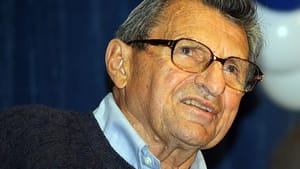Stay in the Loop
BSR publishes on a weekly schedule, with an email newsletter every Wednesday and Thursday morning. There’s no paywall, and subscribing is always free.
"Justice" for Joe Paterno?

State Senator Jake Corman triumphantly crowed that the National Collegiate Athletic Association “surrendered.”
The NCAA agreed to restore 111 victories it had removed from Joe Paterno’s statistical records. It did so to settle a lawsuit filed by two Pennsylvania politicians — Corman, who represents Paterno’s hometown, and State Treasurer Rob McCord, who supposedly represents the interests of all Pennsylvanians.
“It’s never been about the wins,” the coach’s son Jay Paterno told the New York Times. “What’s important is...the reputation of Penn State.” Really? Okay then, the family should have said to the NCAA: “We accept the spirit of your offer, but we respectfully decline it; we will live with the reduction of victories.” And the Paterno family could have asked its supporters to stand down, instead of fanning the flames of rebellion for almost three years.
If you accept the best things said about Joe Pa’s character as fact, then you must infer that Paterno himself would have accepted his penalty without complaint.
Doing the alma mater a disservice
The NCAA imposed sanctions, which Pennsylvania State University consented to. Paterno supporters agitated to rescind those sanctions. This was not the kind of loyalty that alumni should demonstrate toward a great university; Paterno loyalists did a disservice to their alma mater.
The governing body for collegiate sports imposed a $60 million fine on the university, a four-year ban from bowl games (later rescinded), a temporary reduction in football scholarships, and the deduction of 111 victories from the count of 409 in the NCAA record books.
It was fair to reverse the disqualification of current players from bowl game eligibility: They played no part in the Sandusky scandal. It wasn’t fair to reverse the change in Paterno’s numbers: That was only a slap on the wrist for a powerful man who otherwise escaped punishment for the terrible things that happened on his watch.
Judging Paterno
Jerry Sandusky is serving a sentence of 30 to 60 years after being convicted on 45 counts of molesting 10 boys. Graham Spanier, former Penn State president, and Tim Curley, former athletic director, are awaiting trial for perjury, conspiracy, and endangering the welfare of children. If Paterno had lived, no doubt he also would have been indicted.
Paterno, as we know, was the most powerful man at the university. A 2012 report by the former FBI director Louis J. Freeh, commissioned by Penn State, implicated Paterno in the cover-up of Sandusky’s abuses, for not taking action in 1998 when he heard an eyewitness report of Sandusky sexually assaulting a child in the football building’s showers.
Not all Penn Staters share the views of the noisy die-hards. “He had ten years to do the right thing, and he didn’t do it,” William Earley, a Penn State alumnus and a former university donor, said of Paterno. “All the things he talked about — courage, morality and ethical behavior — go out the window.”
Michael Boni, a lawyer who represented one of the victims, says that Paterno “made a huge, huge error in judgment in helping cover up Sandusky’s pedophilia.”
Why Penn State?
Students who came to Penn State after the scandal did so knowing that the school was barred from bowl games and Paterno’s record had been altered, so they chose the school for different values. Some of them selected Penn State specifically because it seemed to be de-emphasizing football. This whitewash of heinous crimes is a slap in the face to everyone who chose to enroll at Pennsylvania State University since 2011.
Football continued at Penn State throughout the sanction period. Even if it had been totally banned, there is much more to Penn State than football. And much, much more than the high-pressure, victory numbers-at-all-costs fixation of pro-Paterno fanatics.
It seems to some Penn State students and parents that Paterno devotees should be thankful that the coach went to his grave without being indicted as others were. Paterno will be remembered for four things. He compiled a superb football record which had no need to be assigned a numerical value. He advocated academic study for all of his athletes. He built a personal fiefdom that was not adequately supervised by the university. And he allowed his top assistant to continue committing crimes against children.
Oh, and a fifth thing. He inspired a crowd of worshipers to the point where they behaved as sore losers. And now as sore winners.
Sign up for our newsletter
All of the week's new articles, all in one place. Sign up for the free weekly BSR newsletters, and don't miss a conversation.

 Steve Cohen
Steve Cohen